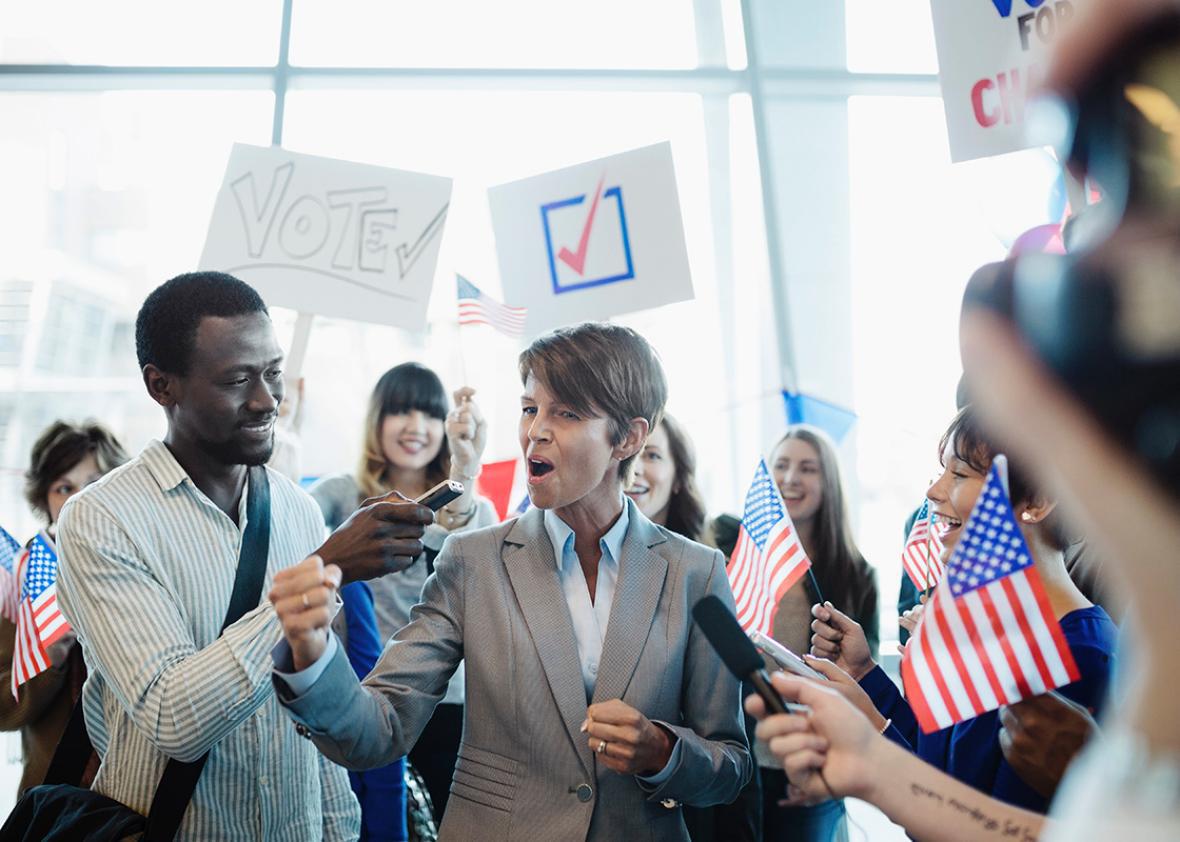This brings together a lot of topics: public opinion, polling, media, polarization, and the duty of citizens and opinion leaders to be responsible consumers and producers of political information (news literacy).
Author Archives: Mike E.
Confronting Deep Fakes and Other Forms of Deception
How can truth prevail in an information environment flooded with deception, including now deep fakes? The reporter in this video segment suggests (1) check the source and (2) Google it. This parallels what I see as the two most essential skills citizens need for navigating today’s incredibly complex information environment. First, they need to be aware of trustworthy and untrustworthy sources and take steps to fill their personal information environment with the former and not the latter. Second, when they encounter an unfamiliar source, they need to know trustworthy sites that evaluate the trustworthiness of sources, like fact-checking sites, Ad Fontes Media, and MediaBiasFactCheck.com. (They also know about the significant shortcomings of sites such as Allsides.com). I don’t think “Googling it” is sufficient, however. It is unknown whether Google’s basic search algorithm adequately filters out fraudulent political information. We know for certain that Google’s YouTube algorithms do not.
Empowering citizens with these skills is essential for protecting the commons from deceptive and fraudulent political communications. An article in Fulcrum points to an additional protection: laws prohibiting the publishing of deep fake videos during an election campaign without disclosing that they are fake:
Gov. Gavin Newsom has signed legislation that prohibits distribution of these artificially created or manipulated videos within 60 days of an election unless the video carries a statement disclosing it has been altered. Texas enacted a similar law late last month.
That the nation’s most populous state, where lawmaking power is entirely in Democrats’ hands, would mirror a new policy in the third-largest state, formulated entirely by Republicans, is a clear indicator that the new world of deepfakes is causing big-time bipartisan worry among politicians. “
While I do not have an opinion at this point about the best regulatory solutions, it seems that both reforms are needed: a radical improvement in citizen political information literacy skills and a new legal framework governing the distribution of political information.
Two Videos of State Legislative Speeches that Can Provoke Discussion of Religious Freedom and Discrimination
‘Senators, I’m asking you, put the stones down, and let’s trust the women who are in this room.’ — This pastor used a Bible story to speak out against a law that would ban early-term abortions in her state pic.twitter.com/I6kP0QFD5a
— NowThis Impact (@nowthisimpact) March 27, 2019
State Rep. Stephanie Borowicz prayed for Trump and insisted everyone bow to Jesus just before Pennsylvania’s first Black Muslim woman Rep. Movita Johnson-Harrell was sworn in pic.twitter.com/ryS2lIn4pk
— NowThis Impact (@nowthisimpact) March 27, 2019
8th Amendment Excessive Fines Clause Incorporated
We need to update our lecture notes, lesson plans, textbooks, etc. The Supreme Court has incorporated another right: the prohibition on “excessive fines” from the Eighth Amendment.
As Ruthann Robson write:
Now the only rights enumerated in the Bill of Rights that are not incorporated through the Fourteenth Amendment to the states are the Third Amendment prohibiting quartering of soldiers, Fifth Amendment right to a grand jury indictment in a criminal case, and the Seventh Amendment right to a jury trial in civil cases.”
Opportunities and Resources for Developing News Literacy Skills

I’ll be posting a lot about media and news literacy in the coming months, but I wanted to share now some of the best resources I’ve encountered. The News Literacy Project, which is a wonderful resource in itself, produces a weekly newsletter called The Sift. Through it, the NLP, in their own words, “sort through recent rumors, hoaxes and other misinformation to bring you the best teachable moments in news literacy.” I’ve been receiving the newsletter for a couple of months, and every time I read it I learn something new and come up with several things I would love to raise in class if I were teaching a live American government course. Anyway, I highly recommend checking out the NLP and subscribing to The Sift. Here are some other great resources:
- Digital Resources and Research on News Literacy created and/or curated by the Center for News Literacy at Stony Brook University.
- “Making Sense of the News: News Literacy Lessons for Digital Citizens.” A free online Coursera course offered by the Center for News Literacy at Stony Brook University and the Journalism and the Media Studies Centre (JMSC) at the University of Hong Kong.
- News and Media Literacy courses and games offered by the Poynter Institute’s News University. Of particular relevance are these self-directed courses and games (some of which are free of charge):
- Media Literacy resources provided by NewseumED
- News Literacy resources provided by iCivics.
- Game: NewsFeed Defenders
Prompting Empirical and Normative Discussion of Low Youth Voter Turnout
This Slate article by Jamelle Bouie offers an interesting empirical account of why youth vote at lower levels and also an interesting claim about the legitimacy of voting when uninformed about issues. Two factors are offered for explaining low turnout among youth: instability experienced by many under 25 at that stage of life and a lack of confidence that they are adequately informed. The first factor is emphasized most in the article, and, as a cure, Bouie proposed reforms aimed at simplifying voter registration and voting. The second factor is addressed in passing, and leads to this provocative normative statement:
There are cultural factors too. Several … interviewees felt too uninformed to responsibly cast a ballot, which suggests a discourse that puts too high a premium on arbitrary political knowledge and not enough on knowing oneself as a political actor with a legitimate claim on the state. Perhaps more young people would vote if they knew knowledge of issues was less important than knowledge of their own interests.’
I could see having a discussion in class about this and then having students watch this video in which Jason Brennan argues against compulsory voting (by defending the normative claim that uninformed citizens should not vote):
One potential problem with this is that Brennan makes some empirically dubious claims about the effects of voter ignorance on policy and that voters do not (or should not) vote in part based on self-interest. It’d be best to go into the discussion armed with some political science research that corrects some of Brennan’s errors. (I’ll provide some of that when I get time.)
Stan Lee and America’s Creed
Stan Lee’s 2007 comic from the Atlantic about what he says is the “one noble idea” America is based on could make for a good discussion on American political culture and the idea that there is a unifying “American Creed.”
For the rest of the comic, follow this link.
More Evidence of Less Support for Democracy by the Young
/cdn.vox-cdn.com/uploads/chorus_asset/file/13362613/Screenshot_2018_10_31_00.22.19.png)
This is from a recent study by Sean Kates, Jonathan M. Ladd, and Joshua A. Tucker. As they sum it up:
… while a large majority of Americans think democracy is the best form of government, nontrivial portions of Americans disagree. They believe that democracy as a form of government tends to serve the elite, and there are times when nondemocratic systems are preferable.
But perhaps even more concerning is that the young are less supportive than older Americans of democracy as a concept. They are not less satisfied with American democracy right now, nor are they less likely to think it is responsive to their needs, but they are less likely to believe that democracy is superior to other forms of government and more likely to believe that it serves the elite.”
Another study, this one by Eric Oliver and Thomas Wood, might seems to dampen this claim, but even they show that the young today are less supportive of certain democratic values than their age group was a generation ago.

Government-Led Democratic Participation Reforms: Lessons from Brazil’s Experience?

If, in a unit on Political Participation, you like discussing the potential for government-led reform efforts to increase democratic participation, you could discuss recent experiences in Brazil as demonstrating both the promise and shortcomings of such efforts.
Link to article
Link to US Civitas Facebook Discussion Thread
Article: “If You Want to Run for Office (and You Should), Start With These Resources”

In case you have a student tell you — as one just did to me — that they are interested in running for office, here’s an incredibly useful list of training opportunities for new political candidates. I’m going to replace an old link in Ch. 2 with this and add it to the Participation Chapter, but I’ll also just send students to this directly whenever they express interest in running for office. If anyone knows of additional good resources for this, please share.
Link to article
Link to US Civitas Facebook Discussion Thread
Research Article: “Dark Parties: Citizens United, Independent-Expenditure Networks and the Evolution of Political Parties”
Article: “Educate to unify: The urgent need for better civic education in our dangerously divided nation”
Discussing Party Differences

If I could find something comparable from a pro-Republican perspective, I’d love to use this (and it) in class as a provocative way to discuss differences between the parties and between party elite vs. ordinary mass public party identifiers. I think it’s important to point out that, even if (big if) this is a somewhat accurate account of Republican activists and elite, it doesn’t mean ordinary Republican voters see things this way. The fact that a lot of Republican voters would object to this portrayal is a good way to discuss the difference between the ideological elite and the relatively non-ideological mass public.
Link to US Civitas Facebook Thread
A Statement on Civility and Civil Discourse

Last week, in one of our large 120-student sections, a student was threatened by another student after class for something she had said in class. She did not see the student’s face, but she heard him say “You better watch what you say, or I’ll shoot you.” Or something like that. After trying and failing to identify the student, we decided that, at a minimum, the instructor should post a message on iCollege and say something in class about the importance of civil discussion and debate, and the unacceptability of threats of violence. I offered to write a first draft of the iCollege message, and I’m posting it here in case anyone would like to adapt the language for their own purposes (preferably as a preventive rather than reactive measure). Here’s the message:
A lot of you are probably as disgusted as I am by acts of politically-motivated violence that have occurred around the country recently. I wanted to take this as an opportunity to discuss something important about our democracy. As we have discussed, the basic hope of our system of government is that we can be free to disagree about all kinds of important things and also to organize politically–often times in competition with those with whom we disagree–to seek to see our views represented in public policy. Proponents of authoritarian government think this is nothing short of insane. To them, it seems like a recipe for anarchy, disorder, and chaos. And yet Americans have governed themselves, however imperfectly, democratically for over 200 years, and we have enjoyed more stability than most countries — whether democratic or authoritarian — could even dream. One reason for this is that our democracy has a variety of customs, practices, and unwritten rules — which political scientists call “norms” — that enable us to debate and compete politically without crossing the line into violence. To be sure, these norms have historically been unevenly recognized. For example, slavery and the Jim Crow system of racial segregation were predicated upon violent suppression of African Americans’ political freedom. But the norms, when recognized and followed, have served Americans well, including, arguably, when the first African American President of the United States demonstrated — by his example — their value throughout his time in office. One of these norms is something we have an opportunity to practice in this class, and I fear is something eroding in our politics. I am referring to the norm of civil discussion and debate. The basic idea with this norm is that we seek to “disagree agreeably.” That is, we are free to express our views insofar as we do so in a respectful way and that we do not in any way deny or threaten anyone else’s right to offer their own potentially contrary views. Civil discussion and debate does not mean we pretend to agree with one another when we in fact disagree. In fact, for it to be meaningful and worthwhile, it requires that we openly express our disagreement. But it does require that we respect the free expression of those with whom we disagree as the price we pay for having our own right of free expression equally respected. Civil discussion and debate is based on reason-giving. It means we do not simply say what we think, but we offer reasoned justifications for what we think. One great hope of such reason-giving is that others will find our reasons persuasive and thereby come around to agreeing with us. But civil discussion and debate also requires acceptance of the fact that others will often remain unpersuaded and that this too is their right. Anyway, there is more to it than this, but I did want to make clear that I welcome discussion and debate in this class, but I expect everyone to conduct themselves according to the norm of civility. Everyone should respect the mutual rights of everyone else to express and justify their viewpoints, and it is never acceptable to threaten or intimidate anyone in or out of class for anything they have expressed in this class. This is not only a vital democratic norm; it is also a university rule. Threatening violence for any reason is strictly forbidden on this campus. I hope it is unnecessary for me to say this, but, like I said, I am afraid the norm of civility is eroding, including on university campuses.”
Link to US Civitas Facebook Thread
A Meme to Consider for Lecture Slide on Freedom of the Press

This meme would go good on a slide when talking about the importance of a free press.
Link to US Civitas Facebook Thread
The Birthright Citizenship Controversy

I was going to write something more substantial here about the Birthright Citizenship controversy, but I don’t have time (today at least). But a quick overview of the legal landscape with good links is provided by Eugene Volokh here and by Adam Liptak here
Link to US Civitas Facebook Discussion Thread
2018 Election in Graphs
Want to Help? Reach Out to Demonstrate You Genuinely Care

With the adaptive learning system, I now receive lists of students falling under one of three categories: high engagement/low performance; low engagement/low performance; low engagement/high performance. The idea is that each of these categories of students faces different challenges and potentially can benefit from different kinds of interventions. I will write more about this in the future, but I did want to mention something that I think is important, and that relates to this very interesting article about how suicides can be prevented by sending certain kinds of messages to patients. We, of course, are not suicide prevention counselors, but I think the research reported in this article reflects a simple and more general truth: people are more receptive to help when they believe “helpers” genuinely care about them. I’m considering different ways of reaching out to the students of the different categories, but I think this article vindicates the approach I took this semester, which was to simply email words of concern (and offer of help) to students in the low performance categories, and words of praise and encouragement (and willingness to meet and discuss grad school, etc.) to students in the higher performance category. I seemed to get a positive response from this approach (although I’m not gathering data to prove it this semester), and the messages from students indicate that it was the expression of genuine care that affected them most. They knew they were in an online class with 700+ other students. They seemed surprised and touched that they were noticed by their teacher and that he cared enough to reach out to them. The other connection to this article is more direct: one student in particular responded to my initial outreach message and told me she had been sexually assaulted, was really struggling, and had already dropped two classes. I have no idea if she was suicidal, but I was able to send her information about counseling services available on campus and to make sure she knew that I and others on campus will do what we can (within our spheres of influence) to support her. In this case, I gave her deadline extensions, which appears to have been enough for her to finish the class successfully. (She also went to counseling, and I of course was legally obligated to report her case to Dean of Students office.) This experience reminds me of what Salman Khan said in his first Ted Talk about using Khan Academy’s adaptive learning system and video tutorials to flip classrooms in low-performing schools. He said that the best part of the technology, somewhat paradoxically, is that it allows for more fully humanizing the student learning experience. My brief experience with sending the messages to students suggests that this is another way that adaptive learning can humanize the learning experience, especially in online courses where students otherwise feel alienated from their instructors.
‘The Best Way to Save People From Suicide‘
Link to US Civitas Facebook Discussion Thread
“Civic Studies” as a New Academic Field
I was at the University of Maryland when the movement toward “Civic Studies” was launched there by three of my professors / mentors–Karol Soltan, Peter Levine, and Stephen Elkin–as well as Elinor Ostrom, Harry Boyte, Jane Mansbridge, and Rogers Smith. The idea was fairly raw at the time, but it has since become much more refined. Indeed, it is now a major at Tufts University where Levine is a Professor of Citizenship & Public Affairs in the Jonathan M. Tisch College of Civic Life. Information about the new academic discipline of Civic Studies can be found here. Levine’s and Erin Kelly’s syllabus for the first offering of Introduction to Civic Studies (Spring 2019) is available here. And here’s a video in which Levine provides an overview of the field’s philosophical assumptions and intellectual influences:
My Musings on the Founders’ Expectations, Voting Behavior, and “Identity Politics”

This Economist article offers an interesting analysis, further confirming the extent to which social group identities are the proper unit of analysis in understanding American politics today.
This could provoke a lot of discussion, but I want to respond to the opening sentence in that article. I’m doing this because I believe the thinkers of the Scottish Enlightenment and their best students (America’s “Founding Fathers,” especially Madison and Hamilton) were very well aware that “all politics is identity politics” and offered many forgotten but helpful insights into how to think about how democracies can seek to reconcile political freedom and the propensity for factional division within a liberal order. I’ve thought this for a long time, but am more confident in that judgment after hearing Stephen Pinker defend a similar thesis when discussing his new book Enlightenment Now on the Ezra Klein show.
The Economist article states “America’s Founding Fathers envisioned a republic in which free-thinking voters would carefully consider the proposals of office-seekers.”
If by “envisioned” the Economist means “expected,” then this is simply wrong. While they believed there was no safer repository for the rights and interests of the people than electoral accountability (and other mechanisms of popular control over government, such as jury trials), they knew the people were unlikely to be informed and thoughtful in their voting behavior. Continue reading


